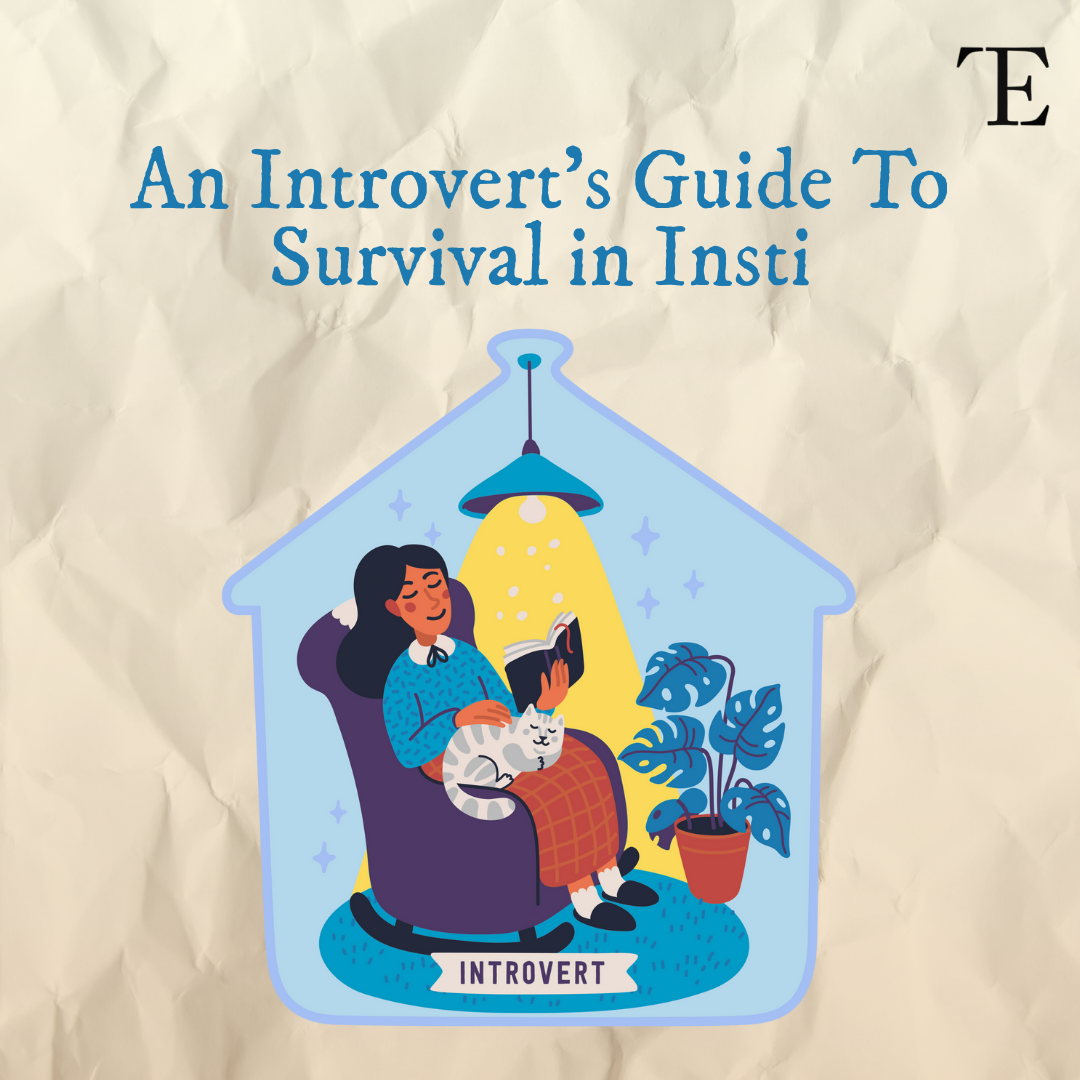The Initiation
You’re swallowed by a crowd in a place you’ve never been before. You know 50 names, but can’t match a single one to a face. It’s too much… and why isn’t the air conditioning working? You decide to take a break, especially since you’re feeling hungry now. “Ugh, so many people”, you think to yourself as you leave. A wave of relief washes over you, only to find the roads crammed with more people and the mess even worse. You quickly finish your dinner and prepare for your first class of the semester. It’s so exciting! You’re a college student. You have to do everything on your own now, except that in everything you do people are around.
From eating to studying to living, it seems like you’ve become one with the crowd. The CCW folks, in what can only be described as a vendetta against 25B girls, added an extra person to every double and triple Swarna room (needless to say, any resemblance to an actual vendetta is purely the invention of our collective overactive imaginations). Now you’re closer to your roommates than your own thoughts. The JEE shell of isolation has been shattered, replaced by a sea of faces and voices.
Diving headfirst into everything Insti
Until a few months ago, your world was just you, a desk, and the JEE syllabus. Social interaction meant the occasional “How’s prep going?” or a random birthday wish on WhatsApp. Now you’ve been dropped into a place where the corridor outside your room is never quiet. Doors are always open, people pop in without knocking, and someone is constantly knocking on the other end of the floor. There’s an orientation every other day, and someone will definitely tell you, “Just come this last time!”, which, spoiler alert, is a lie.
Everywhere you look, there’s something new. Music clubs, dance troupes, sports teams, quirky tech projects, and a dozen more things you once loved but had to give up during JEE prep. It should be exciting to finally have the chance to do them again… except now there’s a catch. To get in, you have to talk to people, fill out applications, and sit through interviews. And as an introvert, that’s a nightmare combination, the social anxiety of meeting strangers mixed with the performance pressure of proving yourself on the spot.
But we don’t talk about the JEE shell, right? Not anymore, at least. There are newer things to worry about. You feel overwhelmed but you are not ready to talk about it. Everyone here is adjusting but for you it is harder to open up unless you meet someone you really trust. Finding those people takes time, so for now you keep most of it to yourself. And that is completely alright.
Holding onto yourself
How do I know all this? Well, because I went through the exact same thing in my first sem. I remember stepping onto campus thinking I had to keep up with the endless introductions, orientations, and all-nighters to go to the beach. And that if I missed even one thing, I’d fall behind, academically and socially. That little voice of FOMO made me say “yes” to everything until I realized my social battery had gone from 100% to “please plug in immediately” in record time.
At some point in those first two months, I had to remind myself that it’s okay to step off the merry-go round for a bit. You don’t have to attend every orientation, event, or fundae session to qualify as a college student. Trust me, the best part of college isn’t grinding orientations and fundae sessions (it is using your smail to get pro versions of different sites for free). Make it a habit to take small, intentional breaks when you feel your energy dipping. It could be skipping a late-night gathering to unwind with a comfort show, going for a walk in the evening, or even just lying down and letting your mind rest. My personal favorite remains going for a walk on Bonn Avenue or Delhi Avenue, exploring the roads I don’t know about, while my current favorites play in the background (earphones also make you look busy, if you’re trying to avoid any conversation). Or treating myself to my favorite flavor of ice cream at Cream Stone or Maggie at Nescafe.
Don’t see these pauses as being antisocial; they’re essential for recharging your mental and emotional batteries. You’ll notice that after a short breather, you return to conversations and events with more energy, genuine interest, and a clearer head. Taking breaks also gave me the headspace to figure out what and who really mattered to me on campus. It wasn’t about attending everything, but about finding the right people and activities that resonated with the person I am and the person I wanted to be.
When I stopped chasing every single “networking opportunity” and started focusing on people and activities I genuinely enjoyed, things got easier. Having one or two solid friends I could be my weird self around was far more satisfying than knowing fifty people by name. Hobbies were the best social icebreakers.
Even a shared obsession over Maggie was enough to spark conversation. The trick is to keep yourself engaged in things you like, at a pace that feels comfortable, because a connection built on comfort lasts much longer. Engage only where you feel like your boundaries are respected. Apply for the clubs and teams you genuinely enjoy, and attend meets and events with the people you relate to the most. See, that’s the thing about Insti: there’s something for everyone.
Competition and Camaraderie: A Janus-faced reality
One trap many of us fall into is thinking that college life is just a race; first to make the most friends, then to grab the best internships, then to land the perfect placement. While those things are essential, treating them as the only purpose of being here can rob you of the very experiences that make college memorable. FOMO doesn’t just apply to missing events; it creeps in when you see someone already working on their resume or signing up for internships in their first year. But the truth is, college is also about exploring, learning outside the classroom, making mistakes, and figuring yourself out.
When you’re always sprinting toward the “next big thing,” you sometimes miss the smaller, quieter joys that you’ll find to be more valuable than a Jane Street PPO (source: trust me bro). But if you’re anything like I was when I first stepped onto campus, quiet, unsure where you fit, you’ll learn that the things worth holding onto aren’t just the fancy paychecks. They’re the afternoons spent reading in a sunny corner, the one friend who holds you dear, and the little traditions you create for yourself. Those moments will stay with you far longer than any offer letter ever could.
Feeling low or homesick can sometimes hit harder when we don’t always have a big circle to vent to right away. That’s okay. It doesn’t mean you’re alone in this experience. Missing home, needing quiet, or just having a bad day doesn’t make you weak. If you need to talk, start with someone you trust, maybe a hostel mate you’ve connected with, your Saathi mentor, or a senior who gets you. And if it ever feels heavier than what a friendly chat can fix, the wellness center is there to listen without judgment. Asking for help is not “too much”, it’s actually a smart way to take care of yourself so you can keep up with the life you want here.
Tips for the Introvert in you
Being an introvert isn’t just awkward silences and missed opportunities at all; it can actually be one of your biggest strengths in college if you know how to use it to your advantage. You have the ability to notice details others might overlook; the classmate who’s sitting alone and could use company, the subtle tension in a team before it escalates, or the slight improvement that could take an idea from “okay” to “amazing.” Your strength lies in depth, not noise. That means you can create meaningful friendships instead of shallow acquaintances, contribute thoughtful ideas instead of rushing to speak, and work on projects that actually excite you rather than joining something just for the sake of it.
Your focus and independence are powerful assets here. Whether you’re studying late into the night, sketching designs, researching for a application, or planning an event from the background, you’re proving that impact doesn’t always need a spotlight. And when you do speak up or step forward, people tend to listen because they know it’s something you’ve thought through. Connecting with other introverts can also be a game-changer; it’s easier to build bonds with people who understand the need for space and quiet. The goal is not to “fix” yourself to match the loudest voices around you, but to sing along with the voices that sync with yours and singing the songs in the pitch your voice can reach.
And the thing is, introversion doesn’t mean you’ll always feel this out of place or overwhelmed. With time, you’ll notice yourself becoming more comfortable in your surroundings, faces will become familiar, routines will settle in, and that initial wave of anxiety will fade. You’ll stumble into friendships that feel effortless, often with people who appreciate your quieter nature. You’ll find people for whom you won’t require social battery to hang out with. And you’ll discover activities you genuinely enjoy, not because they’re popular, but because they make you feel alive in your own way, whether it’s joining a small club, working on a passion project, or just having a go-to coffee spot for when you need a refill. Slowly, the campus will start to feel less like a crowd you’re trying to navigate and more like a home you’ve made your place in.
And the best part? You don’t have to change who you are to do that; in fact, the more you lean into your authentic self, the more fulfilling your college journey becomes.
The Becoming
College can feel like a constant push to be more, do more, and show more, but for introverts, the real magic happens when you stop trying to outpace that noise and start moving at your own rhythm. There’s no rule that says you have to be the most social, the most visible, or the busiest to make these years worthwhile. Staying true to yourself means knowing when to step in and when to step back, when to share and when to listen. Respect who you are, trust your pace, and remember that your quiet strengths, thoughtfulness, focus, and observation are just as valuable as any extrovert’s energy. You’re not “less” for needing recharges; you’re simply wired uniquely, in a good way. And in the long run, it’s often the people who stay authentic that end up creating the most genuine connections and
memories.
written by – Yashna Badiye
edited by – Venkata Sai Vishwesvar
design by – Ridhima Mittal




